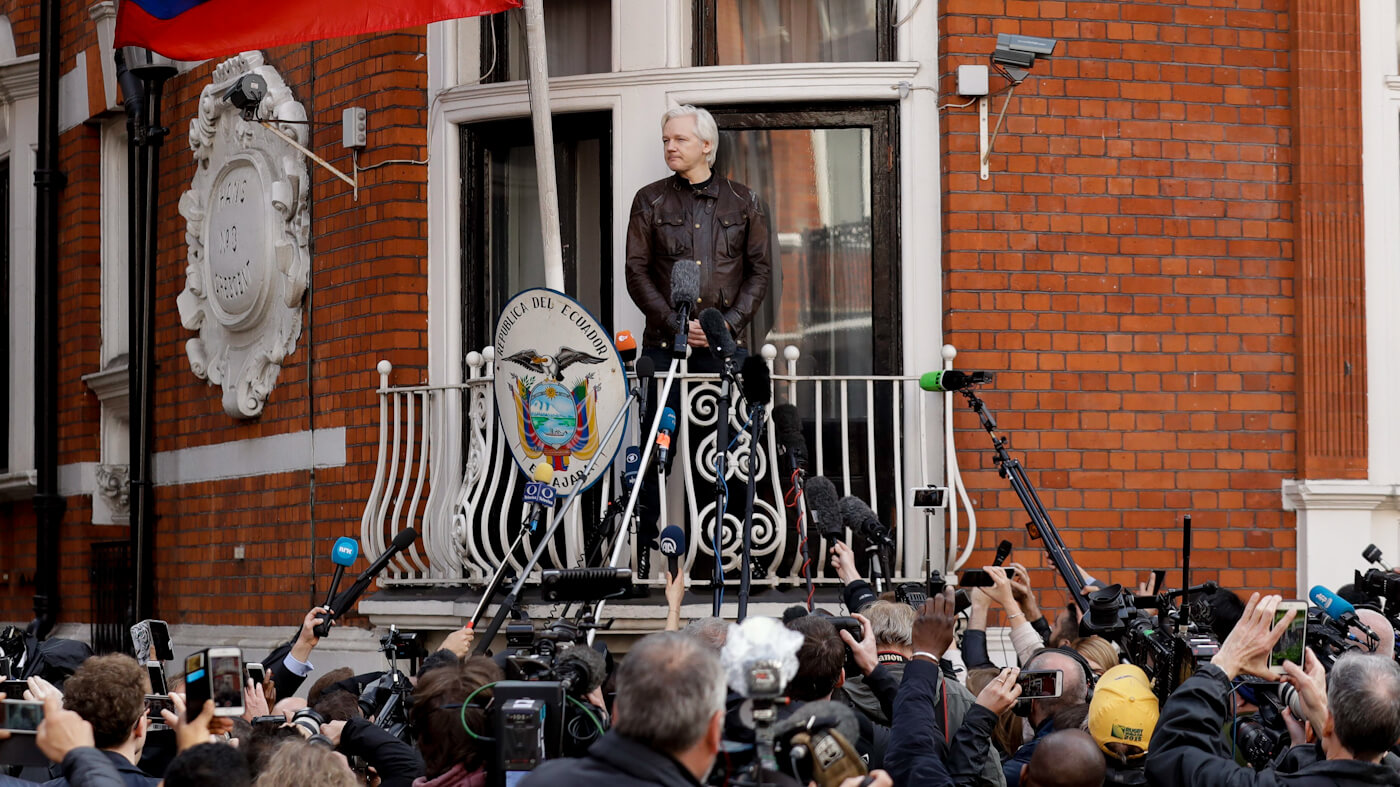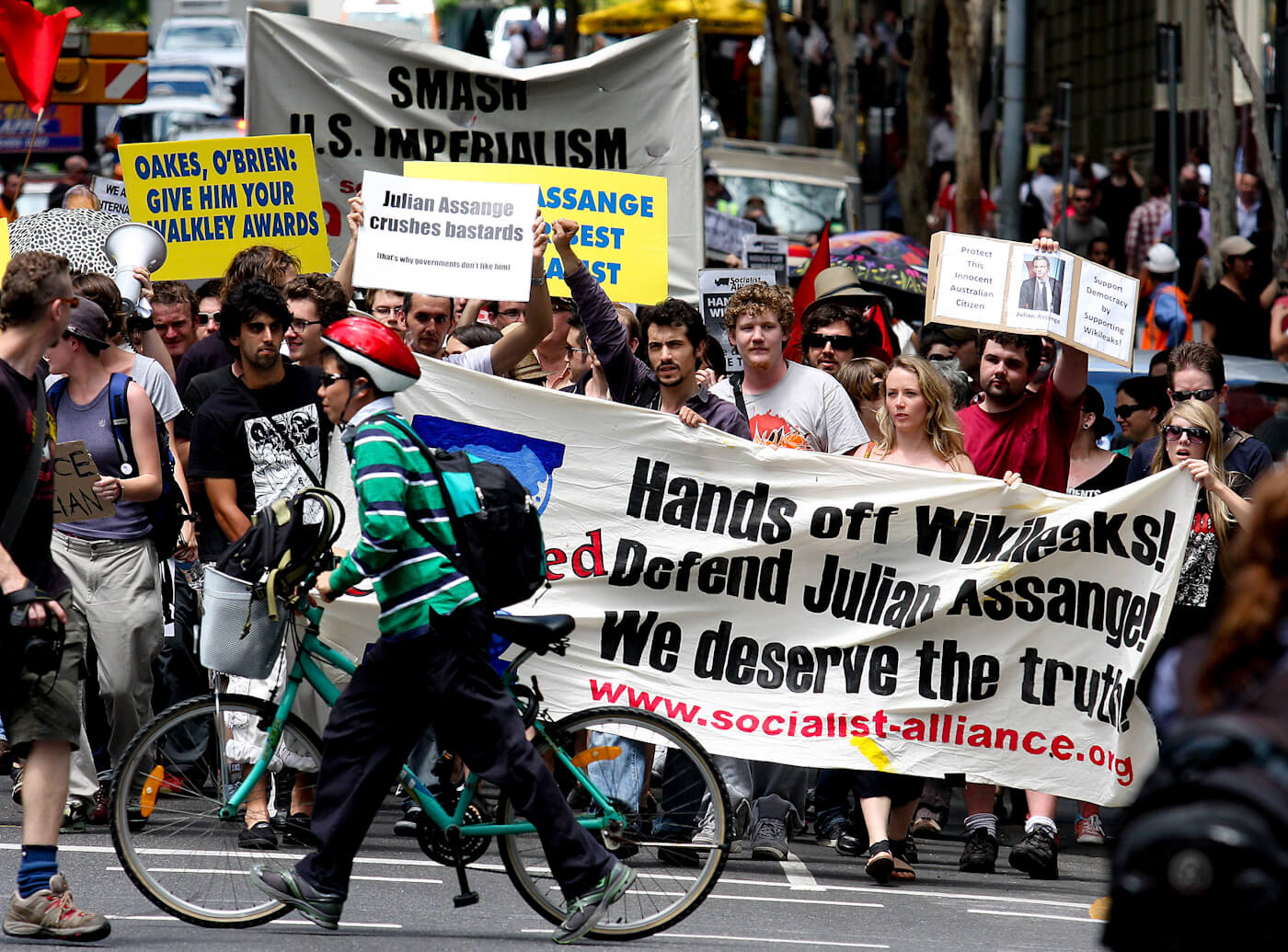Whats Behind Australia’s Decision to Suddenly Grant Julian Assange a Passport?
by Jimmysllama, MintPress News:
 The real question here is why the Australian government is playing nice by issuing Assange a passport since it has refused to acknowledge evidence of a sealed indictment or provide him with any sort of substantial assistance to get him home in the last eight-plus years.
The real question here is why the Australian government is playing nice by issuing Assange a passport since it has refused to acknowledge evidence of a sealed indictment or provide him with any sort of substantial assistance to get him home in the last eight-plus years.
CANBERRA, AUSTRALIA — On February 21, 2019, the Sydney Morning Herald reported that Australia’s Department of Foreign Affairs and Trade (DFAT) issued Julian Assange a new passport despite the fact that DFAT officials had reservations about doing so. According to the article, last year officials stated that Assange’s “entitlement to a passport” might be affected by “an arrest warrant in connection with a ‘serious foreign offence’ within the meaning of Section 13 of the Australian Passports Act 2005.”
Section 13 of the Australian Passports Act states that an application may be rejected if the applicant is subject to an arrest warrant for a serious foreign offense, is restricted from traveling because of a serious foreign offense, or if the issuance of a passport would compromise proceedings connected with a serious foreign offense.
However, it would be extraordinary if the Australian government’s reservations last year had anything to do with a U.S. indictment or charges against Assange, some of which may include charges under the Espionage Act, since it not only went ahead and issued the passport but as recently as last week maintained that there is no evidence of any U.S. charges against Assange.
In fact, parliamentary documents dating back to 2010 reveal not only that the government rarely takes seriously evidence in Assange’s case, but also that it has embraced an entirely passive role in helping to secure his freedom, despite the fact that it has used government pressure and diplomatic power to help free other Australian citizens detained in foreign states.
Transcripts from Parliament also reveal a long-standing pattern when it comes to how the Australian government typically responds to anything Assange-related: “There is no evidence of charges or a sealed indictment against him;” and “We are not able to interfere in the legal processes of any foreign government,” are two sentences from the Australian government we should probably get used to.
This stance has been adhered to despite the fact that there is evidence of charges (evidence is different from proof); Assange has been arbitrarily detained since 2010 and imprisoned in London since 2012; political figures have publicly called for his assassination; the U.K. threatened to storm the Ecuadorian Embassy where Assange sought asylum; the UN has ruled twice that he’s being arbitrarily detained; and he’s been established both legally and professionally as a journalist.
With that said, the real question here is why the Australian government is playing nice by issuing Assange a passport yet it has refused to acknowledge evidence of a sealed indictment against him or provide him with any sort of substantial assistance to get him home in the last eight-plus years.
“Whole-of-government” WikiLeaks Task Force

Potestors march through Brisbane’s city center to protest against the detention of WikiLeaks founder, Julian Assange, in Brisbane, Australia, Dec. 10, 2010. Tertius Pickard | AP
Australia’s abysmal record on supporting Australian journalist and publisher, Julian Assange, became clear in late 2010, when WikiLeaks published Cablegate — a collection of U.S. diplomatic cables that in its entirety spans over 35 years and includes over 270 U.S. embassies, consulates, and diplomatic missions around the world. At the time, the Australian government established a “whole-of-government” WikiLeaks task force similar in nature to the 2010 U.S. WikiLeaks Task Force (WTF) that was created to “make an inventory of the leaked cables” and to report on their impact.
The Australian task force was established by then Attorney-General Robert McClelland at the behest of the Department of the Prime Minister Cabinet, who then became the chair of the group. Other agencies involved included the Department of Foreign Affairs and Trade, Department of Defence, Office of National Assessments, and the Australian Federal Police (AFP). Their job was to closely monitor future Cablegate publications while the AFP was tasked with determining if Assange had broken any laws.
In the meantime, the Australian government contemplated canceling Assange’s passport while then-Prime Minister Julia Gillard publicly decried the publication as a “grossly irresponsible thing to do and an illegal thing to do,” despite the fact that the AFP had not concluded its investigation nor had she been briefed on any alleged illegalities. On December 17, 2010, the AFP concluded that it could not “identify any criminal offence where Australia would have jurisdiction.”
Undeterred by the AFP’s findings and uninterested in protecting an Australian citizen, two months later former Senator and current Australian High Commissioner to the United Kingdom George Brandis asked former AFP Commissioner Tony Negus if the AFP had looked into Assange’s “personal involvement” in the “solicitation of the cables or the posting of the cables.”
Brandis’ question, whether purposely or not, served as a U.S.-government talking point that Assange was directly involved with the procurement of documents that Chelsea Manning allegedly leaked to WikiLeaks — propaganda that seems to have originated publicly with the now-deceased hacker and FBI snitch Adrian Lamo and Wired journalist Kevin Poulsen, and that may be one of the charges used against Assange.
After publishing five major publications during 2010, including a U.S. Intelligence report on WikiLeaks, Collateral Murder, the Afghan War Diary, the Iraq War Logs, and Cablegate, Assange had made some powerful enemies, but even political figures calling his assassination didn’t rouse the Australian government’s interest. After being questioned about comments — made by former Alaska Governor Sarah Palin and the former senior advisor to the Canadian prime minister, Tom Flanagan — that Assange should be “hunted down” and assassinated, then-Minister of Foreign Affairs Kevin Rudd essentially responded that any threats that had occurred should be referred to the United States and Canada.
In the Senate, former Senator Scott Ludlam who fought tirelessly for Assange over the years, tried to address the threats Assange was facing on several occasions, including the possibility of being “transferred without any due process,” also known as “temporary surrender.” During a May 2012 Senate hearing, Ludlam asked the AFP if it would get involved in any situation in which an Australian citizen was being threatened with assassination or extrajudicial killing overseas, to which AFP Commissioner Negus admitted that AFP would need a referral from the Minister of Foreign Affairs — a referral that never came despite “repeated threats of assassination by senior American military officials and civilian political figures.”
And when then-Prime Minister Julia Gillard was confronted with a question about “senior figures in the United States” calling for Assange’s assassination, Gillard effectively ignored the question and responded with the government’s usual rhetoric, “The Australian government cannot interfere in the judicial processes of other countries,” as if death threats fell under this category.
Loading...


